University Self-Awareness Reflection: Johari Window Model Analysis
VerifiedAdded on 2022/07/29
|11
|1894
|31
Essay
AI Summary
This essay provides a comprehensive reflection on the Johari Window model of self-awareness, based on self-assessment results and feedback from peers. The analysis focuses on the individual's emotional intelligence, social skills, and relationship management abilities. The essay critically compares the individual's self-perception with the perceptions of others, highlighting strengths, weaknesses, and areas for improvement. It discusses the four quadrants of the Johari Window—open area, blind spot, hidden area, and unknown area—to identify discrepancies and gain a deeper understanding of self and interpersonal dynamics. The reflection also explores the development of skills necessary for effective global citizenship, such as empathy, social skills, and self-regulation, and how these skills contribute to better communication and collaboration in diverse environments. The essay emphasizes the importance of self-awareness in personal and professional development, offering insights into how individuals can leverage their strengths and address their weaknesses to enhance their overall effectiveness.
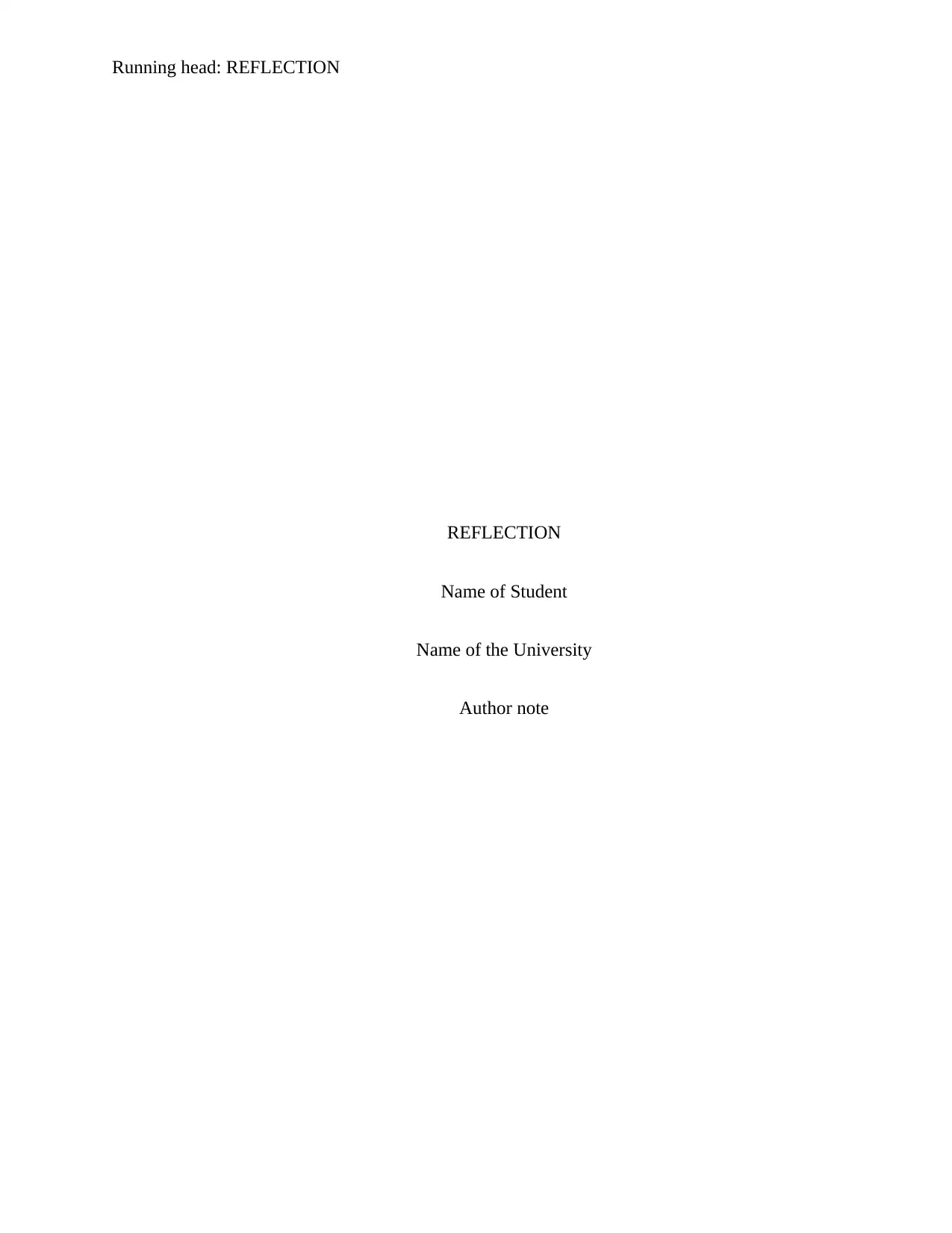
Running head: REFLECTION
REFLECTION
Name of Student
Name of the University
Author note
REFLECTION
Name of Student
Name of the University
Author note
Paraphrase This Document
Need a fresh take? Get an instant paraphrase of this document with our AI Paraphraser
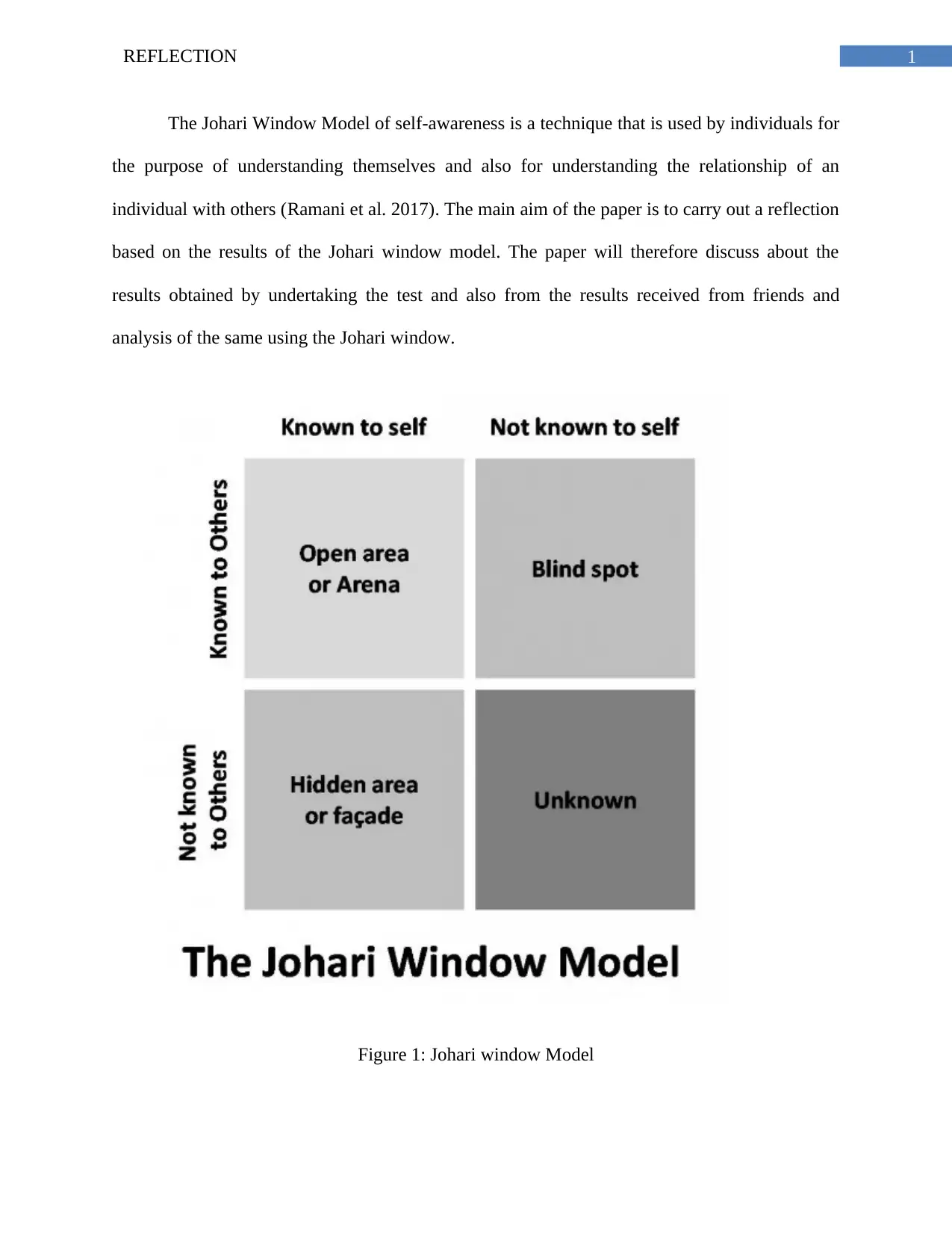
1REFLECTION
The Johari Window Model of self-awareness is a technique that is used by individuals for
the purpose of understanding themselves and also for understanding the relationship of an
individual with others (Ramani et al. 2017). The main aim of the paper is to carry out a reflection
based on the results of the Johari window model. The paper will therefore discuss about the
results obtained by undertaking the test and also from the results received from friends and
analysis of the same using the Johari window.
Figure 1: Johari window Model
The Johari Window Model of self-awareness is a technique that is used by individuals for
the purpose of understanding themselves and also for understanding the relationship of an
individual with others (Ramani et al. 2017). The main aim of the paper is to carry out a reflection
based on the results of the Johari window model. The paper will therefore discuss about the
results obtained by undertaking the test and also from the results received from friends and
analysis of the same using the Johari window.
Figure 1: Johari window Model
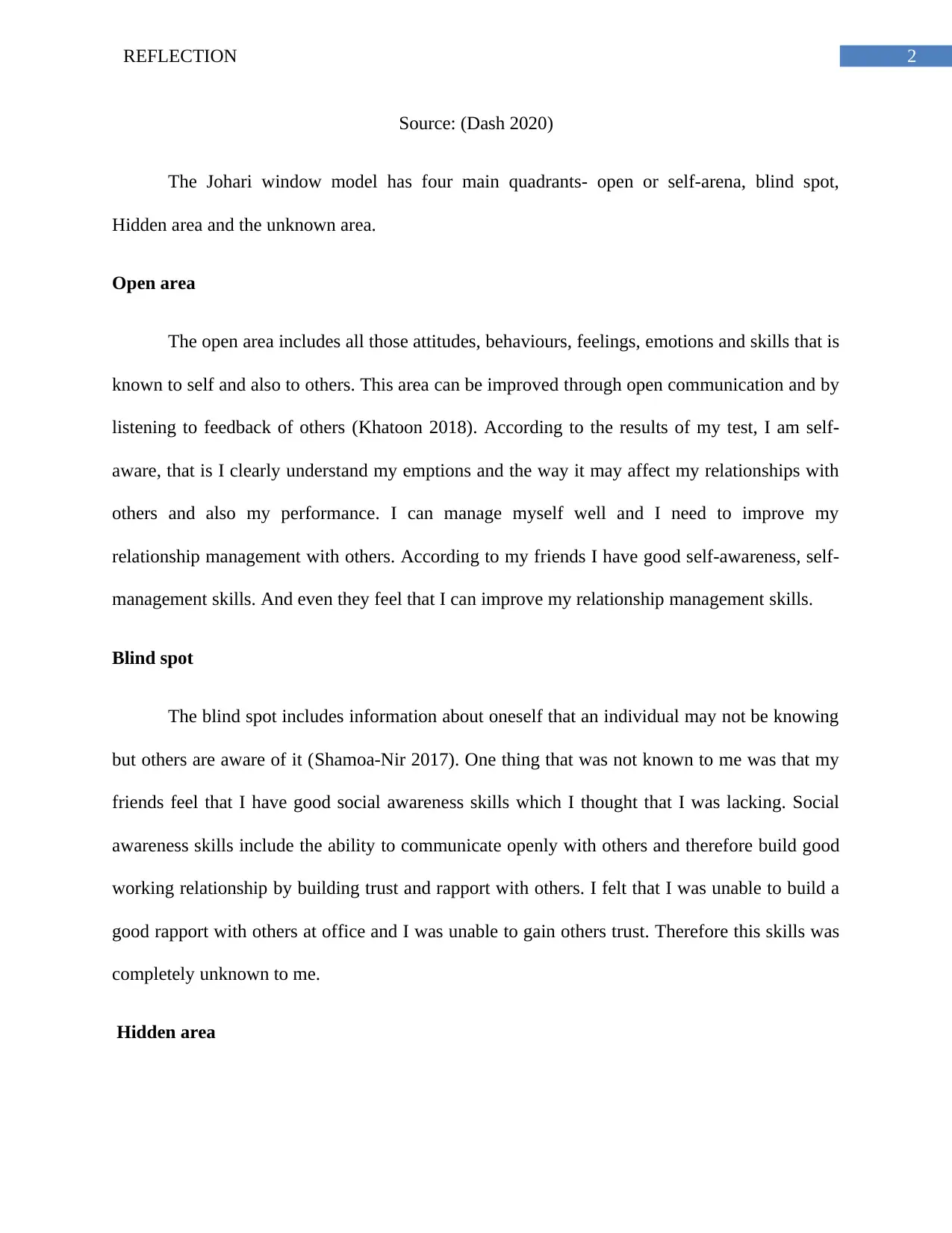
2REFLECTION
Source: (Dash 2020)
The Johari window model has four main quadrants- open or self-arena, blind spot,
Hidden area and the unknown area.
Open area
The open area includes all those attitudes, behaviours, feelings, emotions and skills that is
known to self and also to others. This area can be improved through open communication and by
listening to feedback of others (Khatoon 2018). According to the results of my test, I am self-
aware, that is I clearly understand my emptions and the way it may affect my relationships with
others and also my performance. I can manage myself well and I need to improve my
relationship management with others. According to my friends I have good self-awareness, self-
management skills. And even they feel that I can improve my relationship management skills.
Blind spot
The blind spot includes information about oneself that an individual may not be knowing
but others are aware of it (Shamoa-Nir 2017). One thing that was not known to me was that my
friends feel that I have good social awareness skills which I thought that I was lacking. Social
awareness skills include the ability to communicate openly with others and therefore build good
working relationship by building trust and rapport with others. I felt that I was unable to build a
good rapport with others at office and I was unable to gain others trust. Therefore this skills was
completely unknown to me.
Hidden area
Source: (Dash 2020)
The Johari window model has four main quadrants- open or self-arena, blind spot,
Hidden area and the unknown area.
Open area
The open area includes all those attitudes, behaviours, feelings, emotions and skills that is
known to self and also to others. This area can be improved through open communication and by
listening to feedback of others (Khatoon 2018). According to the results of my test, I am self-
aware, that is I clearly understand my emptions and the way it may affect my relationships with
others and also my performance. I can manage myself well and I need to improve my
relationship management with others. According to my friends I have good self-awareness, self-
management skills. And even they feel that I can improve my relationship management skills.
Blind spot
The blind spot includes information about oneself that an individual may not be knowing
but others are aware of it (Shamoa-Nir 2017). One thing that was not known to me was that my
friends feel that I have good social awareness skills which I thought that I was lacking. Social
awareness skills include the ability to communicate openly with others and therefore build good
working relationship by building trust and rapport with others. I felt that I was unable to build a
good rapport with others at office and I was unable to gain others trust. Therefore this skills was
completely unknown to me.
Hidden area
⊘ This is a preview!⊘
Do you want full access?
Subscribe today to unlock all pages.

Trusted by 1+ million students worldwide
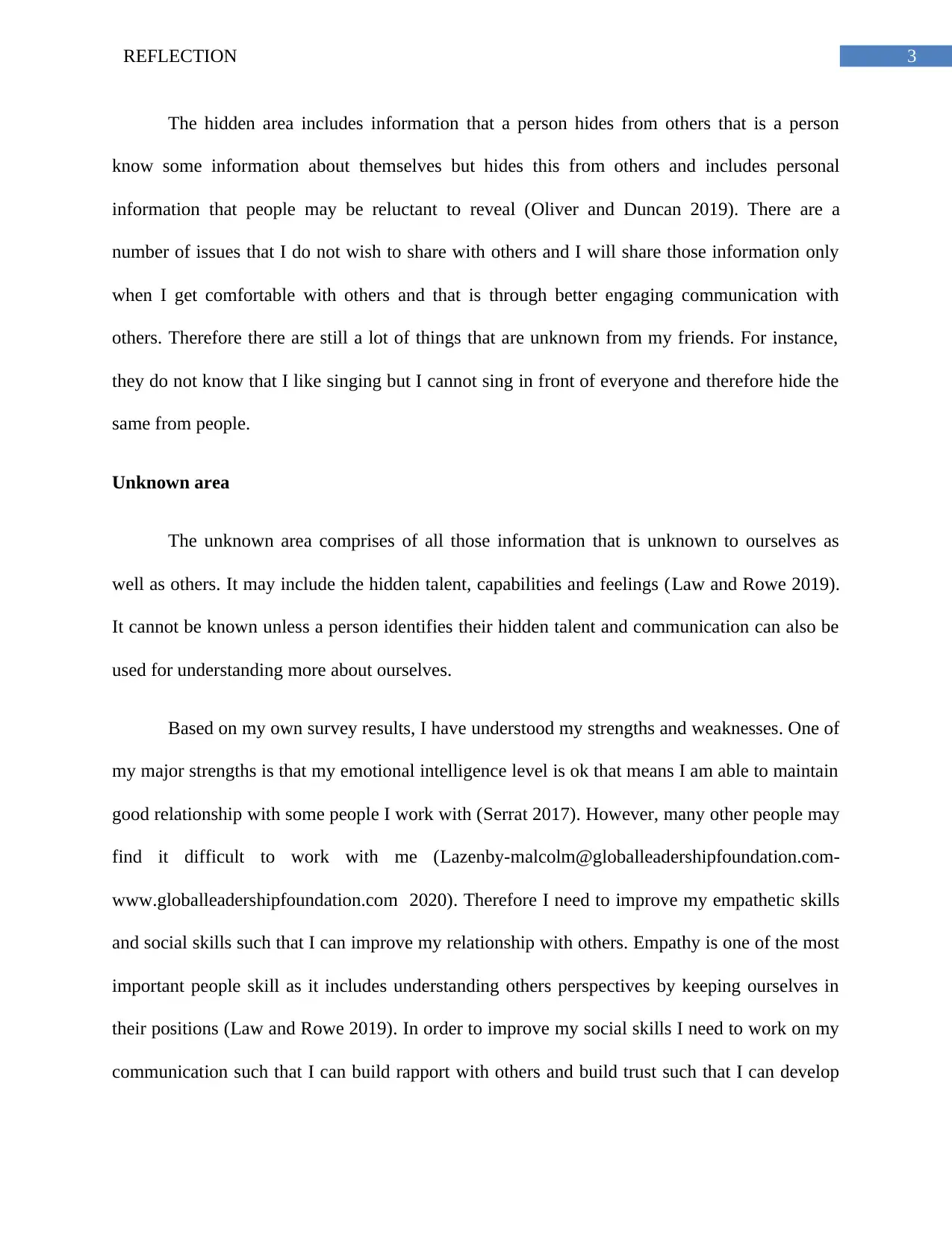
3REFLECTION
The hidden area includes information that a person hides from others that is a person
know some information about themselves but hides this from others and includes personal
information that people may be reluctant to reveal (Oliver and Duncan 2019). There are a
number of issues that I do not wish to share with others and I will share those information only
when I get comfortable with others and that is through better engaging communication with
others. Therefore there are still a lot of things that are unknown from my friends. For instance,
they do not know that I like singing but I cannot sing in front of everyone and therefore hide the
same from people.
Unknown area
The unknown area comprises of all those information that is unknown to ourselves as
well as others. It may include the hidden talent, capabilities and feelings (Law and Rowe 2019).
It cannot be known unless a person identifies their hidden talent and communication can also be
used for understanding more about ourselves.
Based on my own survey results, I have understood my strengths and weaknesses. One of
my major strengths is that my emotional intelligence level is ok that means I am able to maintain
good relationship with some people I work with (Serrat 2017). However, many other people may
find it difficult to work with me (Lazenby-malcolm@globalleadershipfoundation.com-
www.globalleadershipfoundation.com 2020). Therefore I need to improve my empathetic skills
and social skills such that I can improve my relationship with others. Empathy is one of the most
important people skill as it includes understanding others perspectives by keeping ourselves in
their positions (Law and Rowe 2019). In order to improve my social skills I need to work on my
communication such that I can build rapport with others and build trust such that I can develop
The hidden area includes information that a person hides from others that is a person
know some information about themselves but hides this from others and includes personal
information that people may be reluctant to reveal (Oliver and Duncan 2019). There are a
number of issues that I do not wish to share with others and I will share those information only
when I get comfortable with others and that is through better engaging communication with
others. Therefore there are still a lot of things that are unknown from my friends. For instance,
they do not know that I like singing but I cannot sing in front of everyone and therefore hide the
same from people.
Unknown area
The unknown area comprises of all those information that is unknown to ourselves as
well as others. It may include the hidden talent, capabilities and feelings (Law and Rowe 2019).
It cannot be known unless a person identifies their hidden talent and communication can also be
used for understanding more about ourselves.
Based on my own survey results, I have understood my strengths and weaknesses. One of
my major strengths is that my emotional intelligence level is ok that means I am able to maintain
good relationship with some people I work with (Serrat 2017). However, many other people may
find it difficult to work with me (Lazenby-malcolm@globalleadershipfoundation.com-
www.globalleadershipfoundation.com 2020). Therefore I need to improve my empathetic skills
and social skills such that I can improve my relationship with others. Empathy is one of the most
important people skill as it includes understanding others perspectives by keeping ourselves in
their positions (Law and Rowe 2019). In order to improve my social skills I need to work on my
communication such that I can build rapport with others and build trust such that I can develop
Paraphrase This Document
Need a fresh take? Get an instant paraphrase of this document with our AI Paraphraser
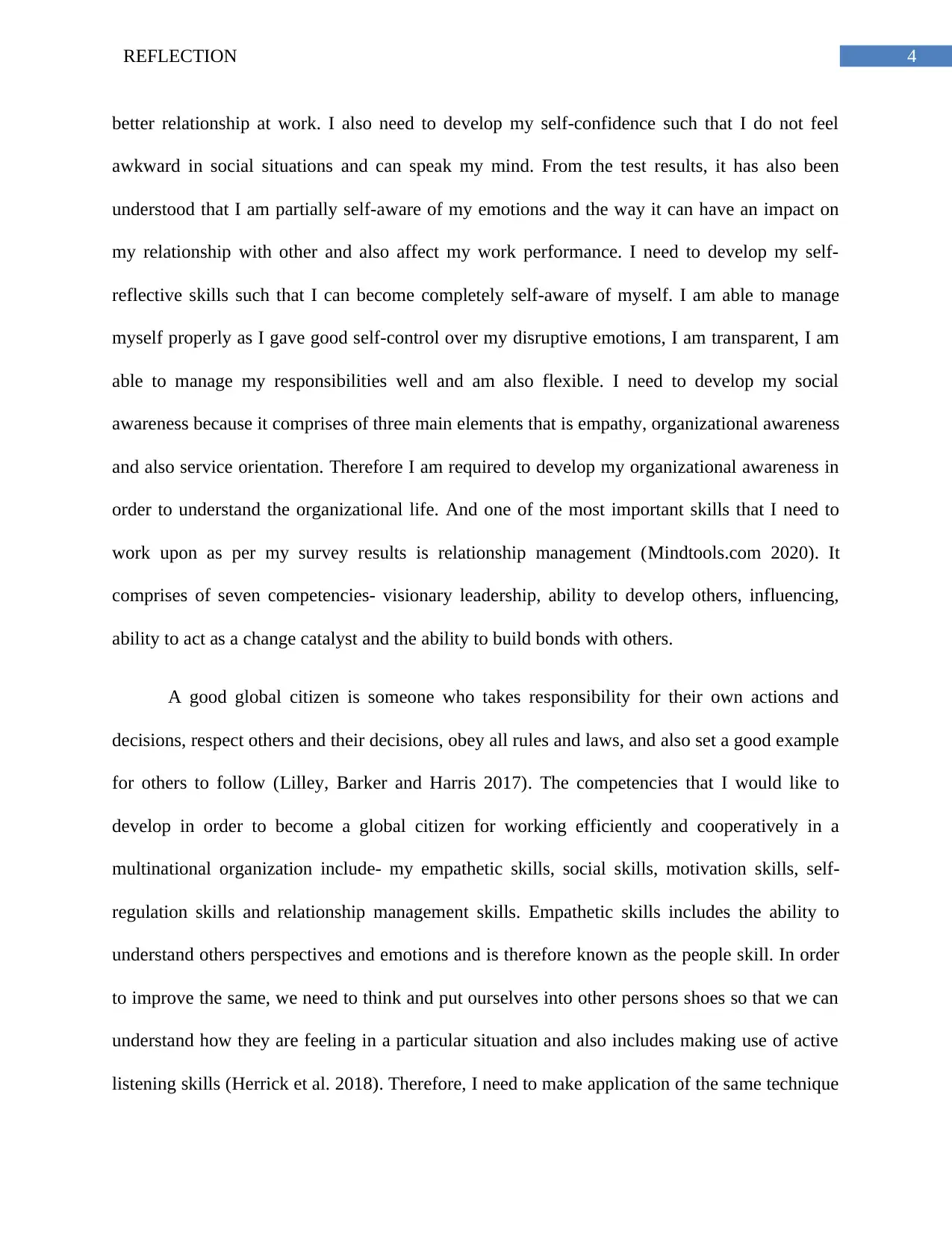
4REFLECTION
better relationship at work. I also need to develop my self-confidence such that I do not feel
awkward in social situations and can speak my mind. From the test results, it has also been
understood that I am partially self-aware of my emotions and the way it can have an impact on
my relationship with other and also affect my work performance. I need to develop my self-
reflective skills such that I can become completely self-aware of myself. I am able to manage
myself properly as I gave good self-control over my disruptive emotions, I am transparent, I am
able to manage my responsibilities well and am also flexible. I need to develop my social
awareness because it comprises of three main elements that is empathy, organizational awareness
and also service orientation. Therefore I am required to develop my organizational awareness in
order to understand the organizational life. And one of the most important skills that I need to
work upon as per my survey results is relationship management (Mindtools.com 2020). It
comprises of seven competencies- visionary leadership, ability to develop others, influencing,
ability to act as a change catalyst and the ability to build bonds with others.
A good global citizen is someone who takes responsibility for their own actions and
decisions, respect others and their decisions, obey all rules and laws, and also set a good example
for others to follow (Lilley, Barker and Harris 2017). The competencies that I would like to
develop in order to become a global citizen for working efficiently and cooperatively in a
multinational organization include- my empathetic skills, social skills, motivation skills, self-
regulation skills and relationship management skills. Empathetic skills includes the ability to
understand others perspectives and emotions and is therefore known as the people skill. In order
to improve the same, we need to think and put ourselves into other persons shoes so that we can
understand how they are feeling in a particular situation and also includes making use of active
listening skills (Herrick et al. 2018). Therefore, I need to make application of the same technique
better relationship at work. I also need to develop my self-confidence such that I do not feel
awkward in social situations and can speak my mind. From the test results, it has also been
understood that I am partially self-aware of my emotions and the way it can have an impact on
my relationship with other and also affect my work performance. I need to develop my self-
reflective skills such that I can become completely self-aware of myself. I am able to manage
myself properly as I gave good self-control over my disruptive emotions, I am transparent, I am
able to manage my responsibilities well and am also flexible. I need to develop my social
awareness because it comprises of three main elements that is empathy, organizational awareness
and also service orientation. Therefore I am required to develop my organizational awareness in
order to understand the organizational life. And one of the most important skills that I need to
work upon as per my survey results is relationship management (Mindtools.com 2020). It
comprises of seven competencies- visionary leadership, ability to develop others, influencing,
ability to act as a change catalyst and the ability to build bonds with others.
A good global citizen is someone who takes responsibility for their own actions and
decisions, respect others and their decisions, obey all rules and laws, and also set a good example
for others to follow (Lilley, Barker and Harris 2017). The competencies that I would like to
develop in order to become a global citizen for working efficiently and cooperatively in a
multinational organization include- my empathetic skills, social skills, motivation skills, self-
regulation skills and relationship management skills. Empathetic skills includes the ability to
understand others perspectives and emotions and is therefore known as the people skill. In order
to improve the same, we need to think and put ourselves into other persons shoes so that we can
understand how they are feeling in a particular situation and also includes making use of active
listening skills (Herrick et al. 2018). Therefore, I need to make application of the same technique
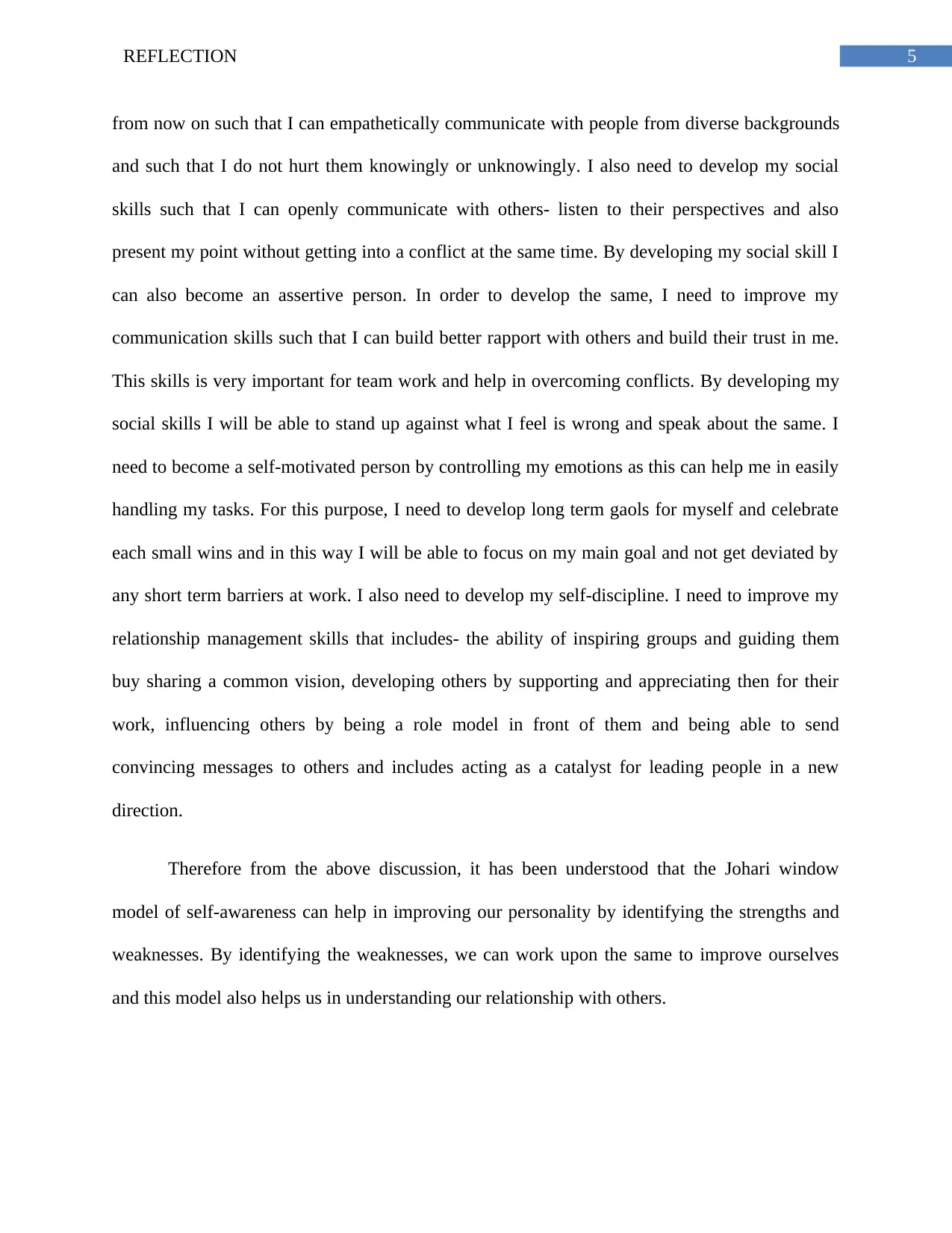
5REFLECTION
from now on such that I can empathetically communicate with people from diverse backgrounds
and such that I do not hurt them knowingly or unknowingly. I also need to develop my social
skills such that I can openly communicate with others- listen to their perspectives and also
present my point without getting into a conflict at the same time. By developing my social skill I
can also become an assertive person. In order to develop the same, I need to improve my
communication skills such that I can build better rapport with others and build their trust in me.
This skills is very important for team work and help in overcoming conflicts. By developing my
social skills I will be able to stand up against what I feel is wrong and speak about the same. I
need to become a self-motivated person by controlling my emotions as this can help me in easily
handling my tasks. For this purpose, I need to develop long term gaols for myself and celebrate
each small wins and in this way I will be able to focus on my main goal and not get deviated by
any short term barriers at work. I also need to develop my self-discipline. I need to improve my
relationship management skills that includes- the ability of inspiring groups and guiding them
buy sharing a common vision, developing others by supporting and appreciating then for their
work, influencing others by being a role model in front of them and being able to send
convincing messages to others and includes acting as a catalyst for leading people in a new
direction.
Therefore from the above discussion, it has been understood that the Johari window
model of self-awareness can help in improving our personality by identifying the strengths and
weaknesses. By identifying the weaknesses, we can work upon the same to improve ourselves
and this model also helps us in understanding our relationship with others.
from now on such that I can empathetically communicate with people from diverse backgrounds
and such that I do not hurt them knowingly or unknowingly. I also need to develop my social
skills such that I can openly communicate with others- listen to their perspectives and also
present my point without getting into a conflict at the same time. By developing my social skill I
can also become an assertive person. In order to develop the same, I need to improve my
communication skills such that I can build better rapport with others and build their trust in me.
This skills is very important for team work and help in overcoming conflicts. By developing my
social skills I will be able to stand up against what I feel is wrong and speak about the same. I
need to become a self-motivated person by controlling my emotions as this can help me in easily
handling my tasks. For this purpose, I need to develop long term gaols for myself and celebrate
each small wins and in this way I will be able to focus on my main goal and not get deviated by
any short term barriers at work. I also need to develop my self-discipline. I need to improve my
relationship management skills that includes- the ability of inspiring groups and guiding them
buy sharing a common vision, developing others by supporting and appreciating then for their
work, influencing others by being a role model in front of them and being able to send
convincing messages to others and includes acting as a catalyst for leading people in a new
direction.
Therefore from the above discussion, it has been understood that the Johari window
model of self-awareness can help in improving our personality by identifying the strengths and
weaknesses. By identifying the weaknesses, we can work upon the same to improve ourselves
and this model also helps us in understanding our relationship with others.
⊘ This is a preview!⊘
Do you want full access?
Subscribe today to unlock all pages.

Trusted by 1+ million students worldwide
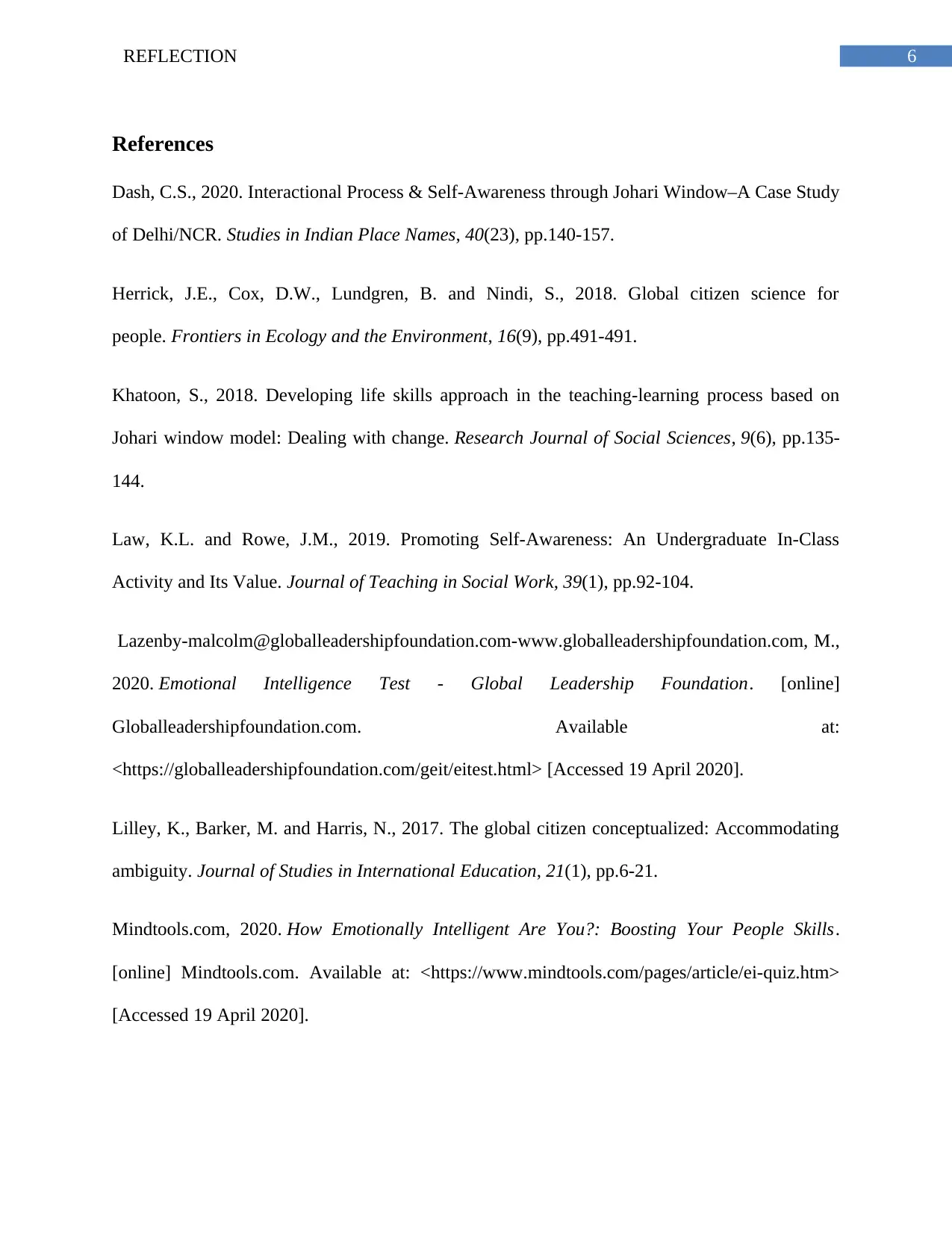
6REFLECTION
References
Dash, C.S., 2020. Interactional Process & Self-Awareness through Johari Window–A Case Study
of Delhi/NCR. Studies in Indian Place Names, 40(23), pp.140-157.
Herrick, J.E., Cox, D.W., Lundgren, B. and Nindi, S., 2018. Global citizen science for
people. Frontiers in Ecology and the Environment, 16(9), pp.491-491.
Khatoon, S., 2018. Developing life skills approach in the teaching-learning process based on
Johari window model: Dealing with change. Research Journal of Social Sciences, 9(6), pp.135-
144.
Law, K.L. and Rowe, J.M., 2019. Promoting Self-Awareness: An Undergraduate In-Class
Activity and Its Value. Journal of Teaching in Social Work, 39(1), pp.92-104.
Lazenby-malcolm@globalleadershipfoundation.com-www.globalleadershipfoundation.com, M.,
2020. Emotional Intelligence Test - Global Leadership Foundation. [online]
Globalleadershipfoundation.com. Available at:
<https://globalleadershipfoundation.com/geit/eitest.html> [Accessed 19 April 2020].
Lilley, K., Barker, M. and Harris, N., 2017. The global citizen conceptualized: Accommodating
ambiguity. Journal of Studies in International Education, 21(1), pp.6-21.
Mindtools.com, 2020. How Emotionally Intelligent Are You?: Boosting Your People Skills.
[online] Mindtools.com. Available at: <https://www.mindtools.com/pages/article/ei-quiz.htm>
[Accessed 19 April 2020].
References
Dash, C.S., 2020. Interactional Process & Self-Awareness through Johari Window–A Case Study
of Delhi/NCR. Studies in Indian Place Names, 40(23), pp.140-157.
Herrick, J.E., Cox, D.W., Lundgren, B. and Nindi, S., 2018. Global citizen science for
people. Frontiers in Ecology and the Environment, 16(9), pp.491-491.
Khatoon, S., 2018. Developing life skills approach in the teaching-learning process based on
Johari window model: Dealing with change. Research Journal of Social Sciences, 9(6), pp.135-
144.
Law, K.L. and Rowe, J.M., 2019. Promoting Self-Awareness: An Undergraduate In-Class
Activity and Its Value. Journal of Teaching in Social Work, 39(1), pp.92-104.
Lazenby-malcolm@globalleadershipfoundation.com-www.globalleadershipfoundation.com, M.,
2020. Emotional Intelligence Test - Global Leadership Foundation. [online]
Globalleadershipfoundation.com. Available at:
<https://globalleadershipfoundation.com/geit/eitest.html> [Accessed 19 April 2020].
Lilley, K., Barker, M. and Harris, N., 2017. The global citizen conceptualized: Accommodating
ambiguity. Journal of Studies in International Education, 21(1), pp.6-21.
Mindtools.com, 2020. How Emotionally Intelligent Are You?: Boosting Your People Skills.
[online] Mindtools.com. Available at: <https://www.mindtools.com/pages/article/ei-quiz.htm>
[Accessed 19 April 2020].
Paraphrase This Document
Need a fresh take? Get an instant paraphrase of this document with our AI Paraphraser
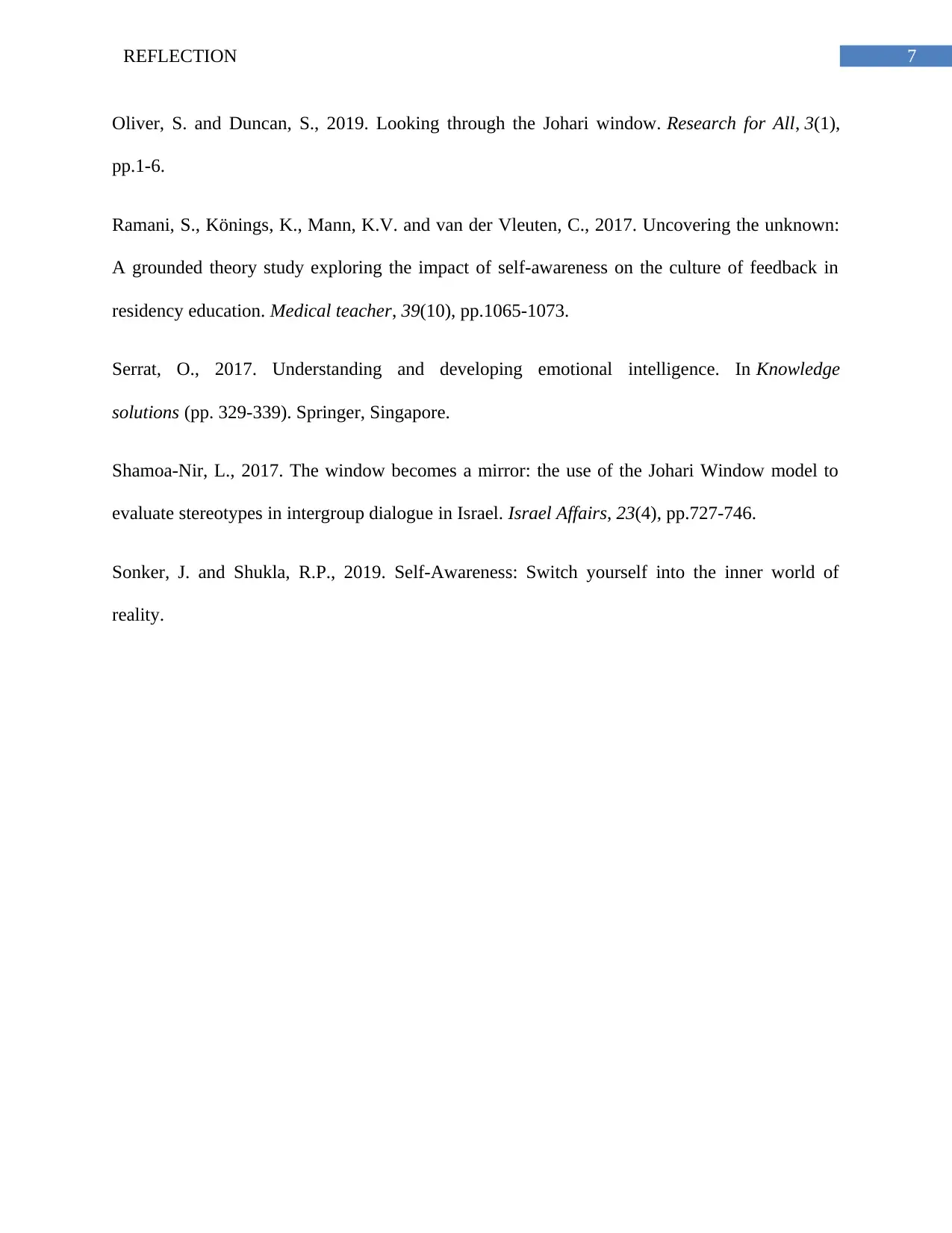
7REFLECTION
Oliver, S. and Duncan, S., 2019. Looking through the Johari window. Research for All, 3(1),
pp.1-6.
Ramani, S., Könings, K., Mann, K.V. and van der Vleuten, C., 2017. Uncovering the unknown:
A grounded theory study exploring the impact of self-awareness on the culture of feedback in
residency education. Medical teacher, 39(10), pp.1065-1073.
Serrat, O., 2017. Understanding and developing emotional intelligence. In Knowledge
solutions (pp. 329-339). Springer, Singapore.
Shamoa-Nir, L., 2017. The window becomes a mirror: the use of the Johari Window model to
evaluate stereotypes in intergroup dialogue in Israel. Israel Affairs, 23(4), pp.727-746.
Sonker, J. and Shukla, R.P., 2019. Self-Awareness: Switch yourself into the inner world of
reality.
Oliver, S. and Duncan, S., 2019. Looking through the Johari window. Research for All, 3(1),
pp.1-6.
Ramani, S., Könings, K., Mann, K.V. and van der Vleuten, C., 2017. Uncovering the unknown:
A grounded theory study exploring the impact of self-awareness on the culture of feedback in
residency education. Medical teacher, 39(10), pp.1065-1073.
Serrat, O., 2017. Understanding and developing emotional intelligence. In Knowledge
solutions (pp. 329-339). Springer, Singapore.
Shamoa-Nir, L., 2017. The window becomes a mirror: the use of the Johari Window model to
evaluate stereotypes in intergroup dialogue in Israel. Israel Affairs, 23(4), pp.727-746.
Sonker, J. and Shukla, R.P., 2019. Self-Awareness: Switch yourself into the inner world of
reality.
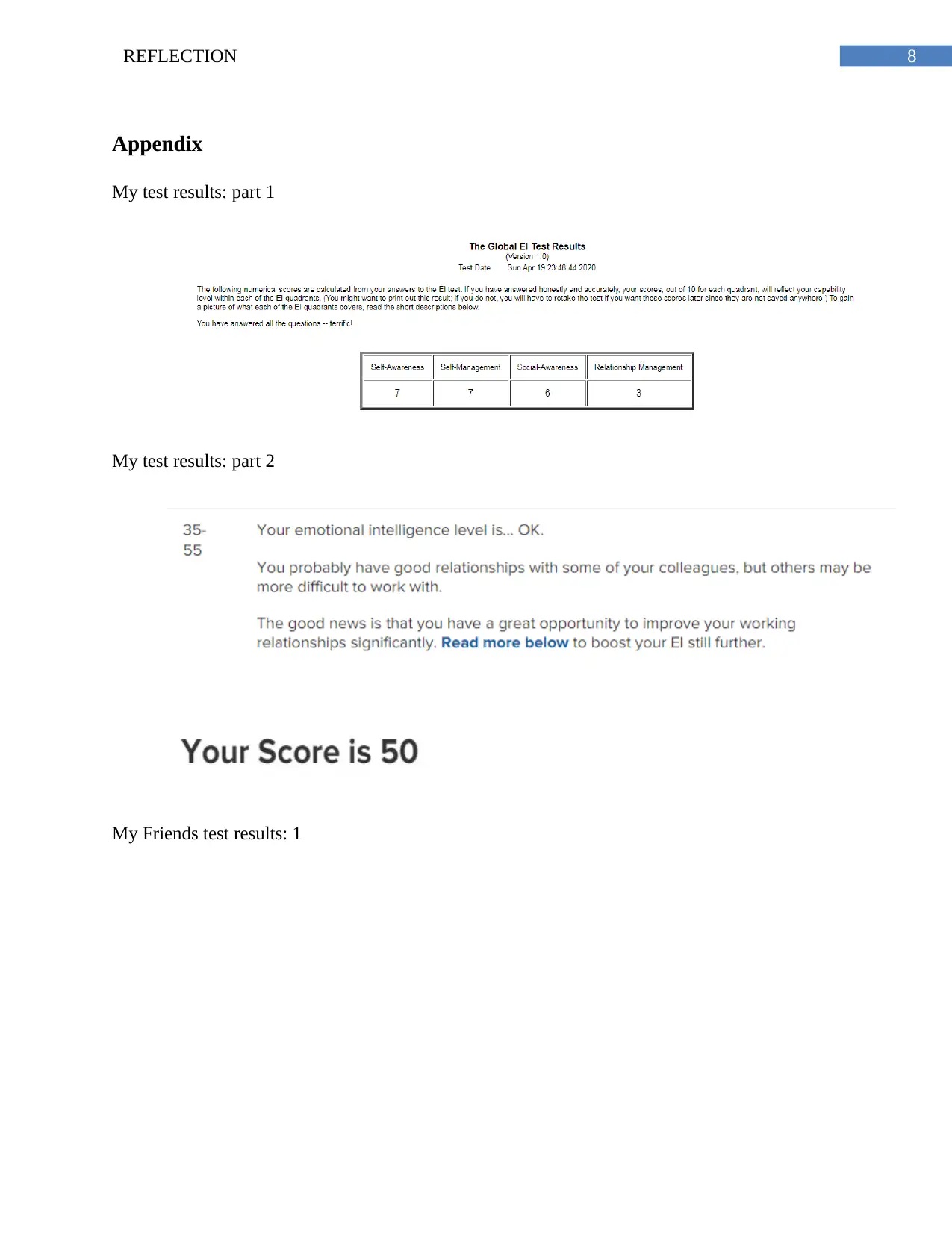
8REFLECTION
Appendix
My test results: part 1
My test results: part 2
My Friends test results: 1
Appendix
My test results: part 1
My test results: part 2
My Friends test results: 1
⊘ This is a preview!⊘
Do you want full access?
Subscribe today to unlock all pages.

Trusted by 1+ million students worldwide
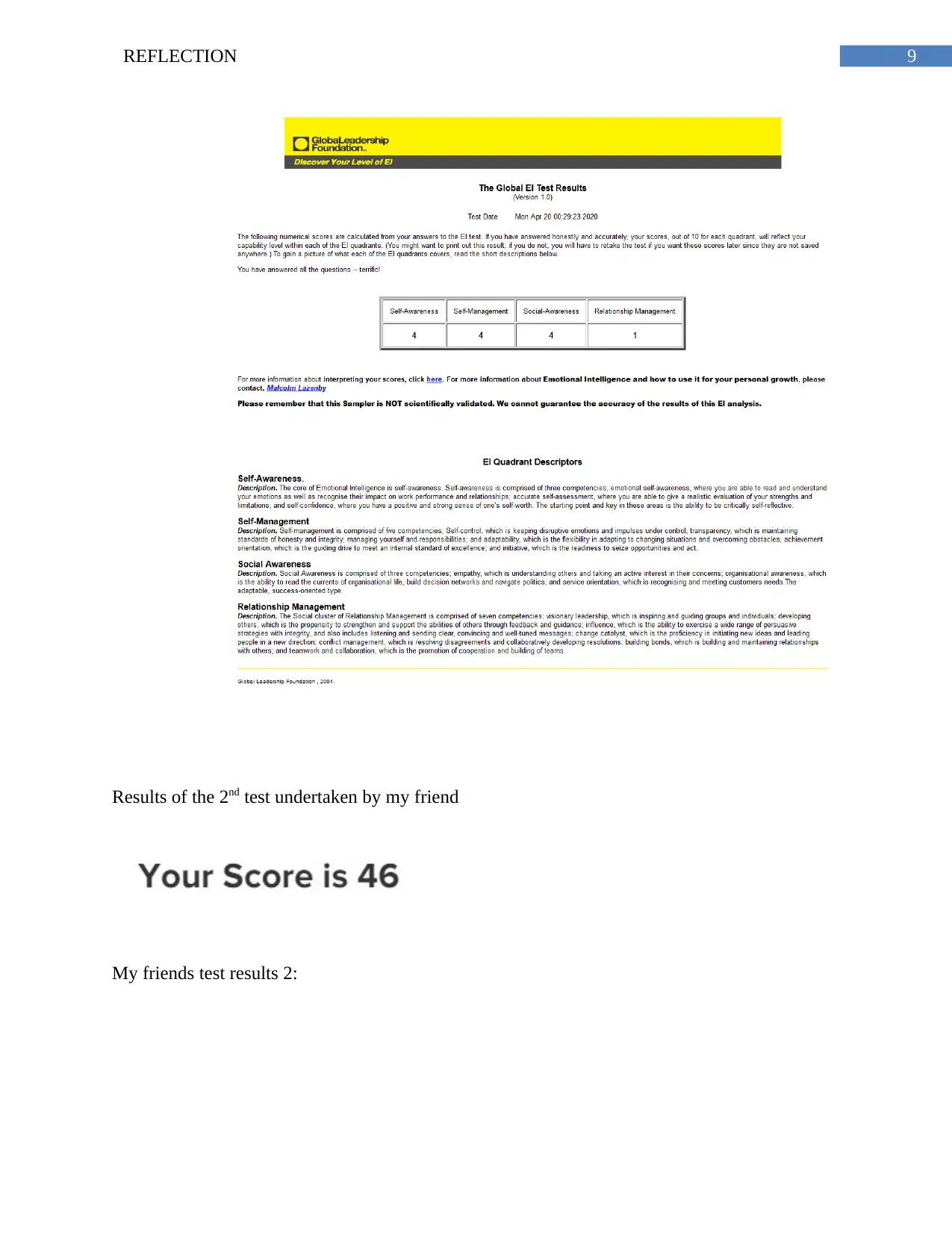
9REFLECTION
Results of the 2nd test undertaken by my friend
My friends test results 2:
Results of the 2nd test undertaken by my friend
My friends test results 2:
Paraphrase This Document
Need a fresh take? Get an instant paraphrase of this document with our AI Paraphraser
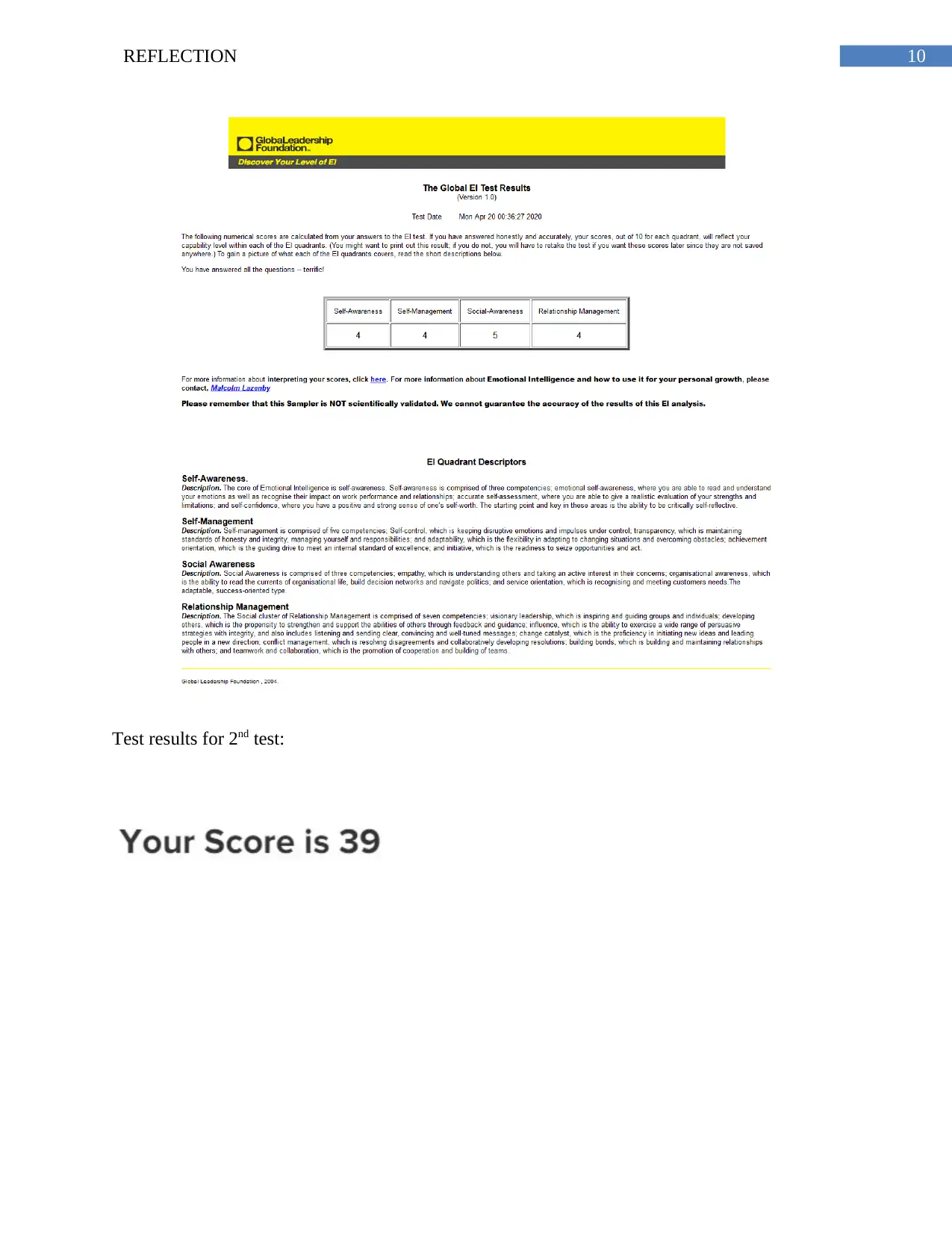
10REFLECTION
Test results for 2nd test:
Test results for 2nd test:
1 out of 11
Related Documents
Your All-in-One AI-Powered Toolkit for Academic Success.
+13062052269
info@desklib.com
Available 24*7 on WhatsApp / Email
![[object Object]](/_next/static/media/star-bottom.7253800d.svg)
Unlock your academic potential
Copyright © 2020–2026 A2Z Services. All Rights Reserved. Developed and managed by ZUCOL.





